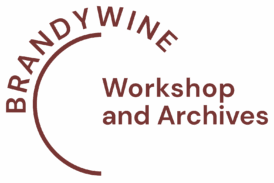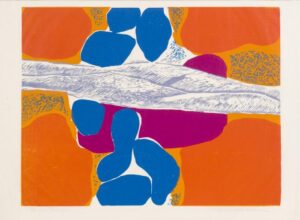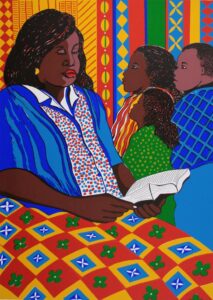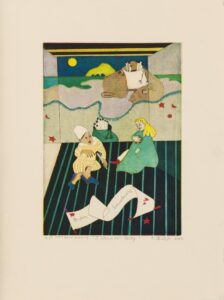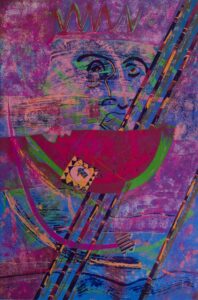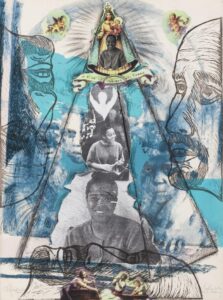Special Collections
Special Collections
Explore our special collections:
Brandywine Workshop and Archives’ Permanent Collection includes prints made by over 450 resident artists at BWA to date. More than 1,100 limited edition prints have been published by BWA as screen prints, woodcuts, offset-lithographs, monographs, collages, and mixed-media works. The Permanent Collection also comprises of more than 300 prints donated to BWA by private individuals, artists, and special collections representing the organizations featured in the links below.
In 1947, African American artist, master printmaker, and teacher Robert Blackburn (1920–2003) purchased a lithographic press. A year later, at age 28, he opened the Printmaking Workshop (in New York City), which became the largest and longest-operating nonprofit print workshop in the United States. In 1971, the Printmaking Workshop incorporated as a nonprofit organization with a mission to uphold creative and artistic excellence; support and encourage innovation; create opportunities for Third World and minority artists; and cultivate public appreciation of the fine art print. It was renowned for its open, informal, and welcoming atmosphere.
Health complications led Blackburn to close the Printmaking Workshop in 2002. As a program of the Elizabeth Foundation for the Arts, the Robert Blackburn Printmaking Workshop reopened in 2005, extending Blackburn’s legacy by making space for multicultural artists to experiment not only in printmaking but in the graphic arts.
Artist and master printer Sam Coronado (1946–2013), founder of Coronado Print Studio and the Serie Project, was a leading advocate for raising awareness of cultural diversity through printmaking. Inspired by his experience as an artist-in-residence at Self Help Graphics & Art in East Los Angeles, CA, he founded Coronado Print Studio in Austin, TX, in 1991. In 1993, Coronado launched the Serie Project – an artist-residency program dedicated to promoting the art of serigraphy (a form of silkscreen printing) and highlighting the work of underrepresented artists.
Collectively, Coronado Print Studio and the Serie Project continue to provide an enduring platform for established and emerging Latinx artists to reach new and expanding audiences while exploring and building the impact of their creativity. As of 2021, Coronado Print Studio and the Serie Project had sponsored more than 250 artists from various technical and cultural backgrounds.
The Hatch-Billops Collection first took shape in 1968 in New York City, where visual artist Camille Billops (1933–2019) and her husband, James V. Hatch (1928–2020), were teaching art and literature at the City College of New York. In 1975, the couple formally established the Hatch-Billops Collection, Inc. as a nonprofit research library located in their loft in Lower Manhattan’s SoHo neighborhood.
With support from the National Endowment for the Humanities, they expanded the archive through oral histories with Black artists across disciplines. Billops built the collection further by photographing the works of Black artists in exhibitions and private collections while Hatch focused on collecting published and unpublished plays, set designs, theater programs, and historical and biographical works. The result was an extensive archive of books, periodicals, photographs, artworks, and printed ephemera.
From 1981 to 1999, they published Artist and Influence: The Journal of Black American Cultural History, amplifying voices that had long gone unheard. Their donation to Emory University in Atlanta—The Camille Billops and James V. Hatch Archives—now stands as a premier resource for research in 20th-century African American arts and letters.
Over the years, the couple also cultivated a relationship with Brandywine. Hatch-Billops gifted 13 of Billops’s prints to Brandywine, and Billops eventually went on to produce three works as an artist-in-residence at the workshop.
Franciscan nun and master printmaker Sister Karen Boccalero formally established Self Help Graphics & Art (SHG) in 1976 in East Los Angeles. At the height of the Chicano Civil Rights Movement in 1970, Boccalero was studying in Rome, where she shared studio space and formed a lasting friendship with Allan L. Edmunds, future founder of Brandywine Workshop and Archives (BWA). In the early 1990s, SHG and BWA exchanged 30 prints from their respective visiting-artist collections and launched an exchange program that brought SHG artists to Philadelphia to produce lithographs at BWA.
SHG has long stood as one of the most prominent Latinx printmaking centers in the United States and beyond, producing the largest known collection of Chicanx and Latinx fine art prints. It has also supported nationwide and international partnerships, collaborations, and cultural exchanges —fostering the creation and advancement of new limited edition fine art prints and monoprints. The focus on experimentation, innovation, and a peer-led approach to printmaking, nurtures imagination and advances artists’ careers. Through SHG’s cornerstone Professional Printmaking Program, more than 1,000 editions of silkscreen prints have been created by an ever-growing community of local and visiting Chicanx and Latinx artists.
The Experimental Graphics Workshop of Havana was founded in 1962 by mural artist Orlando Suarez (1926-1986) with the support of Che Guevara (1928–1967), who was Cuba’s minister of industry at the time. The workshop continues to thrive today.
The Taller is one of the most important workshops of its type, preserving traditional printmaking techniques and producing some of the most significant works of graphic art created by Havana’s talent-rich artist community in the modern and contemporary era. In addition to local practitioners, it attracts international artists who value the “flavor of art that is produced there as well as the unique gathering of artists who work and study there.” Upstairs at the Taller, the Galería del Grabado (Print Gallery) sells original etchings, lithographs, woodcuts, and collagraphs that are made in the workshop.
Support Our Work
Learn how your support is making a difference in the lives of artists, educators, and students.
